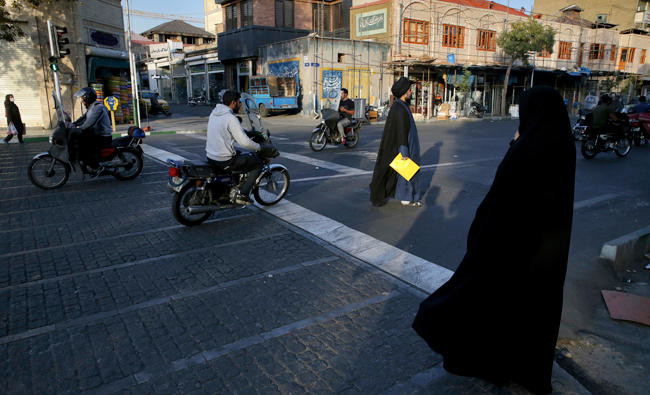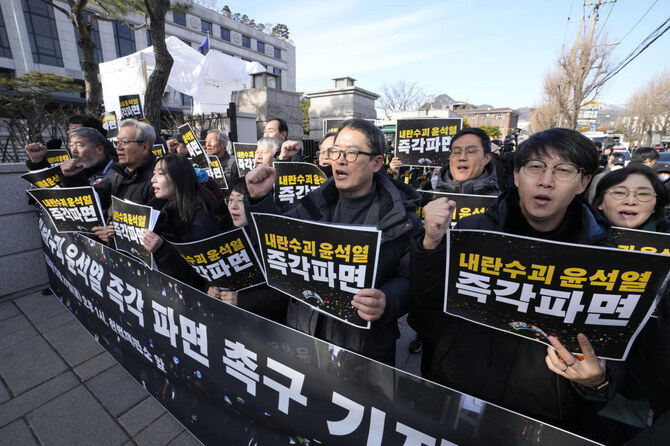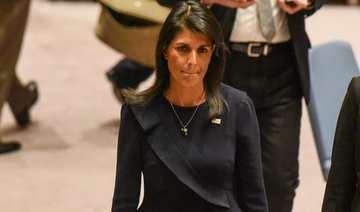MOSCOW: Moscow warned on Monday there would be “negative consequences” if US President Donald Trump fails to uphold the landmark Iran nuclear deal negotiated by his predecessor.
Trump has said Tehran is living up to the “spirit” of the agreement.
He is a fierce critic of the 2015 accord, which he has called “the worst deal ever,” and US officials say he intends to tell Congress next week that Tehran is not honoring its side of the bargain.
“Obviously if one country leaves the deal, especially such a key country as the US, then that will have negative consequences,” Russian President Vladimir Putin’s spokesman said.
“We can only try to predict the nature of these consequences, which we are doing now,” Dmitry Peskov told journalists.
Putin has repeatedly hailed the importance of the existing deal, he added.
Speaking in Beijing, Chinese Foreign Ministry spokeswoman Hua Chunying said the nuclear deal was a good example of how to solve something peacefully through talks.
The agreement had played a positive and important role in ensuring nuclear non-proliferation and protecting peace and stability in the Middle East, she added.
“We hope that the comprehensive Iran nuclear agreement can continue to be earnestly implemented,” Hua told a daily news briefing.
The Chinese remarks came as UN atomic agency chief affirmed Iran’s commitment to the nuclear deal.
“I can state that the nuclear-related commitments undertaken by Iran under the (nuclear agreement) are being implemented,” International Atomic Energy Agency (IAEA) chief Yukiya Amano said in prepared remarks during a conference in Rome.
An IAEA report released last month had also affirmed Iran’s compliance with the program, which froze some of Tehran’s nuclear activities.
Iran’s stock of low-enriched uranium — used for peaceful purposes, but when further processed for a weapon — did not exceed the agreed limit of 300 kg, the report said.
It added that Iran “has not pursued the construction of the Arak... reactor” — which could give it weapons-grade plutonium — and has not enriched uranium above low purity levels.
The EU’s diplomatic chief Federica Mogherini said Iran’s compliance with the accord had been verified on at least eight separate occasions.
It is time to “invest in international cooperation” and “open new channels and not destroy the ones we already have,” she said by video conference.
It is “certainly not the time to dismantle them.”
Faced with the growing threat from North Korea, “we cannot afford to open a new front,” Mogherini added.
Trump is expected to announce that he is “decertifying” Iran’s compliance with the agreement it signed to limit its nuclear program in exchange for sanctions relief.
US officials insist this will not sink the deal itself but open the way for Congress to possibly develop new measures to punish other aspects of Iran’s behavior.
Resumed sanctions could derail the accord negotiated with Tehran by former president Barack Obama and other major world powers.
Congress requires the president to certify Iranian compliance with the deal every 90 days. The next certification date is Oct. 15.
Under the law, Congress would then have 60 days to decide whether to reimpose sanctions lifted by the deal.
The landmark deal was signed in July 2015 by Iran and five permanent members of the UN Security Council (Britain, China, France, Russia and the United States) plus Germany — establishing controls to prevent Tehran from developing an atomic bomb.
‘Negative consequences’ if Trump quits Iran deal: Kremlin
‘Negative consequences’ if Trump quits Iran deal: Kremlin

Kremlin says no comment on Azerbaijani plane crash until investigation completed

- Pro-government website Caliber cites unnamed officials as saying they believed a Russian missile fired from a Pantsir-S air defense system downed the plane
The Azerbaijan Airlines jet crashed near the Kazakh city of Aktau, an oil and gas hub, on Wednesday after going off course for undetermined reasons.
Thirty-eight of the 67 people on board died.
“An investigation is underway, and until the conclusions of the investigation, we do not consider we have the right to make any comments and we will not do so,” Kremlin spokesman Dmitry Peskov told reporters.
The Embraer 190 aircraft was supposed to fly northwest from the Azerbaijani capital Baku to Grozny in Chechnya, southern Russia, but instead diverted far off course across the Caspian Sea.
An investigation is underway, with the pro-government Azerbaijani website Caliber citing unnamed officials as saying they believed a Russian missile fired from a Pantsir-S air defense system downed the plane.
Azerbaijan Airlines said Friday that it was suspending flights to a total of seven Russian cities, “taking into account flight safety risks,” after earlier saying it had stopped flights to Grozny and to Makhachkala in Dagestan, which neighbors Chechnya.
Rasim Musabekov, an Azeri lawmaker, urged Russia to apologize for the incident.
“They have to accept this, punish those to blame, promise that such a thing will not happen again, express regrets and readiness to pay compensation,” Musabekov said in an interview. “We are waiting for Russia to do this.”
He said the plane “was damaged in the sky over Grozny and asked to make an emergency landing.”
“According to all the rules of aviation, they should have allowed this and organized it.”
Instead the plane was not allowed to land at Grozny or nearby Russian airports and was “sent far away” across the Caspian Sea to Kazakhstan with “GPS switched off,” Musabekov said.
If air defenses were operating near Grozny airport, “they should have closed the air space. The plane should have been turned around as it approached Grozny. Why wasn’t this done?” he added.
Some aviation and military experts said the plane might have been accidentally shot by Russian air defense systems because it was flying in an area where Ukrainian drone activity had been reported.
Ukraine sends food aid to Syria, says Zelensky

KYIV: Ukraine, a global producer and exporter of grain and oilseeds, has sent its first batch of food aid to Syria, President Volodymyr Zelensky said on Friday.
Zelensky said that 500 metric tons of wheat flour were already on their way to Syria as part of Ukraine’s humanitarian “Grain from Ukraine” initiative in cooperation with the United Nations World Food Programme.
“The wheat flour is planned to be distributed to 33,250 families or 167,000 people, in the coming weeks,” Zelensky said on X, adding: “Each package weighs 15 kilograms and can feed a family of five for one month.”
After the ouster of Bashar Assad, a close Russian ally, Ukraine has said it wants to restore relations with Syria.
Kyiv traditionally exports wheat and corn to countries in the Middle East, but not to Syria.
During Assad’s era, Syria imported food from Russia. But Russian wheat supplies to Syria have been suspended because of uncertainty, Russian and Syrian sources said earlier this month.
Ukraine’s exports were disrupted by Russia’s February 2022 invasion, which severely reduced shipments via the Black Sea. Ukraine has since broken a de facto sea blockade and revived exports from its southern port of Odesa.
Desertions spark panic, and pardons, in Ukraine’s army

- Manpower problems present a critical hurdle for Ukraine, which is losing territory to Russia at the fastest rate since the early days of the February 2022 invasion
UNDISCLOSED, Ukraine: Oleksandr deserted from the front line in eastern Ukraine after watching his fellow servicemen being pulverized by Russian bombardments for six months. Then, those remaining were ordered to counterattack.
It was the final straw for Oleksandr, 45, who had been holding the line in the embattled Lugansk region in the early months of the war. Even his commanding officer was reluctant to send his men back toward what looked like certain death.
So when Oleksandr saw an opening to save his life, he did.
“We wanted to live. We had no combat experience. We were just ordinary working people from villages,” the soft-spoken serviceman, who declined to give his last name, said.
His decision is just one of many cases plaguing the Ukrainian military, which has already suffered at least 43,000 losses in nearly three years of fighting, President Volodymyr Zelensky revealed this month.
The government is also struggling to recruit new troops.
Together, these manpower problems present a critical hurdle for Ukraine, which is losing territory to Russia at the fastest rate since the early days of the February 2022 invasion.
The issue was put under the spotlight in September when 24-year-old serviceman Sergiy Gnezdilov announced in a scathing social media post that he was leaving his unit in protest over indefinite service.
“From today, I am going AWOL with five years of impeccable soldiering behind me, until clear terms of service are established or until my 25th birthday,” he wrote.
The state investigation service described his statement as “immoral” and said it played into Russia’s hands. He was detained and faces up to 12 years in prison.
Figures published by the Ukrainian general prosecutor’s office show that more than 90,000 cases have been opened into instances of soldiers going absent without leave or deserting since Russia invaded in 2022, with a sharp increase over the past year.
Oleksandr said that after leaving the frontline, he remembered little from the year he spent at home in the Lviv region owing to concussions he suffered while deployed.
He recounted “mostly drinking” to process the horrors he witnessed but his guilt was mounting at the same time.
He ultimately decided to return after seeing young Ukrainians enlist or wounded troops return to battle — despite pleas from his family.
His brother was beaten during the historic Maidan protests in 2013 that toppled Ukraine’s pro-Kremlin leader, and later died.
His sister was desperate. “They’re going to kill you. I would rather bring you food to prison than flowers to your grave,” he recounted his sister telling him during a visit from Poland.
It was guilt, too, that motivated Buch, who identified himself by a military nickname, to return to battle.
The 29-year-old deserted after being wounded in fierce fighting in southern Ukraine in late 2022 during the liberation of Kherson city.
“Just staying under constant shelling gradually damages your mental state. You go crazy step by step. You are all the time under stress, huge stress,” he said of his initial decision to abscond.
In an effort to address manpower shortages, Ukrainian lawmakers in August approved an amnesty for first-time offenders who voluntarily returned to their units.
Both the 47th and 53rd brigades in December announced they would welcome back servicemen who had left the front without permission, saying: “We all make mistakes.”
Prosecutors said in early December that 8,000 servicemen that went absent without leave or deserted had returned in November alone.
Still, Siver, commander of the 1st Separate Assault Battalion, known as Da Vinci, who also identified himself by his military nickname, said the number of Ukrainian troops fleeing the fighting without permission was growing.
That is partly because many of the most motivated fighters have already been killed or wounded.
“Not many people are made for war,” said Siver, describing how his perceptions of bravery had been reshaped by seeing those who stood their ground, and those who fled.
“There are more and more people who are forced to go,” he said, referring to a large-scale and divisive army mobilization campaign.
But other servicemen interviewed by AFP suggested that systemic changes in military culture — and leadership — could help deter desertions.
Buch said his military and medical training as well as the attitudes of his superiors had improved compared to his first deployment, when some officers “didn’t treat us like people.”
Siver suggested that better psychological support could help troops prepare for the hardships and stress of battle.
“Some people think it’s going to be like in a movie. Everything will be great, I’ll shoot, I’ll run,” he said.
“But it’s different. You sit in a trench for weeks. Some of them are knee-deep in mud, cold and hungry.”
He said there was no easy solution to discouraging desertion, and predicted the trend would worsen.
“How do you reduce the numbers? I don’t even know how. We just have to end the war,” he said.
South Korea’s parliament impeaches acting president Han Duck-soo

- The motion led by opposition parties passed with 192 of the 300 votes amid rowdy scenes by ruling People Power Party members
SEOUL: South Korea’s parliament impeached acting President Han Duck-soo on Friday over a short-lived martial law, plunging the country deeper into political chaos, as the Constitutional Court said it would swiftly trial suspended President Yoon Suk Yeol.
The impeachment of Han, who has been acting president since Yoon was impeached on Dec. 14 for declaring martial law on Dec. 3, has thrown South Korea’s once-vibrant democratic success story into uncharted territory.
The motion led by opposition parties passed with 192 of the 300 votes amid rowdy scenes by ruling People Power Party members who surrounded the speaker’s podium chanting the vote was invalid and parliament had committed “tyranny.”
Ahead of the parliamentary session, opposition leader Lee Jae-myung said his Democratic Party, which has majority control of parliament, will go ahead with the plan to impeach the acting president, accusing Han of “acting for insurrection.”
“The only way to normalize the country is to swiftly root out all the insurrection forces,” Lee said in a fiery speech, adding the party was acting on the public order to eradicate those who have put the country at risk.
There has been overwhelming public support for Yoon’s removal, according to opinion polls conducted after his martial law attempt.
The plan for a vote to impeach Han was unveiled on Thursday by the main opposition Democratic Party after he declined to immediately appoint three justices to fill vacancies at the Constitutional Court, saying it would exceed his acting role.
Until just before voting began, it was unclear how many votes were needed to impeach Han as acting leader. The threshold for a prime minister is a simple majority, while a two-thirds majority is needed for a president.
Speaker Woo Won-shik declared a simple majority would constitute parliamentary approval.
Han said in a statement after the vote that he would step aside to avoid more chaos and will await a Constitutional Court ruling on his impeachment.
By law Finance Minister Choi Sang-mok will assume the acting presidency.
Choi earlier pleaded with parliament to withdraw the plan to impeach Han, saying it would do serious damage to the country’s economy.
The South Korean won retreated to 1,475.4 per dollar, down 0.53 percent at 0707 GMT ahead of the parliamentary vote.
The vote to determine Han’s fate comes on the same day the Constitutional Court held its first hearing in a case reviewing whether to overturn the impeachment and reinstate Yoon or remove him permanently from office. It has 180 days to reach a decision.
North Korean soldier captured in Ukraine died from injuries – South Korea’s spy agency

- The soldier was captured by the Ukrainian army
- Location where he was seized was unknown
SEOUL: South Korea’s spy agency said Friday it had confirmed that a North Korean soldier sent to back Russia’s war against Ukraine had been captured by Ukrainian forces.
Pyongyang has deployed thousands of troops to reinforce Russian troops, including in the Kursk border region where Ukraine mounted a shock border incursion in August.
“Through real-time information sharing with an allied country’s intelligence agency, it has been confirmed that one injured North Korean soldier has been captured,” South Korea’s National Intelligence Service said in a statement.
The soldier was captured by the Ukrainian army, an intelligence source told AFP, adding that the location where he was seized was unknown.
The first confirmation of the capture of a North Korean soldier came days after Ukrainian President Volodymyr Zelensky said Monday that nearly 3,000 North Korean soldiers had been “killed or wounded” so far.
Seoul’s Joint Chiefs of Staff (JCS) also said Monday that more than 1,000 North Korean soldiers have been killed or wounded.
The JCS had also said that Pyongyang is reportedly “preparing for the rotation or additional deployment of soldiers” and supplying “240mm rocket launchers and 170mm self-propelled artillery” to the Russian army.
Seoul’s military believes that North Korea was seeking to modernize its conventional warfare capabilities through combat experience gained in the Russia-Ukraine war.
North Korean state media said Friday that Russian President Vladimir Putin sent a New Year’s message to North Korean leader Kim Jong Un, saying “the bilateral ties between our two countries have been elevated after our talks in June in Pyongyang.”
A landmark defense pact went into effect in December after the two sides exchanged ratification documents.
Putin hailed the deal in June as a “breakthrough document.”




















